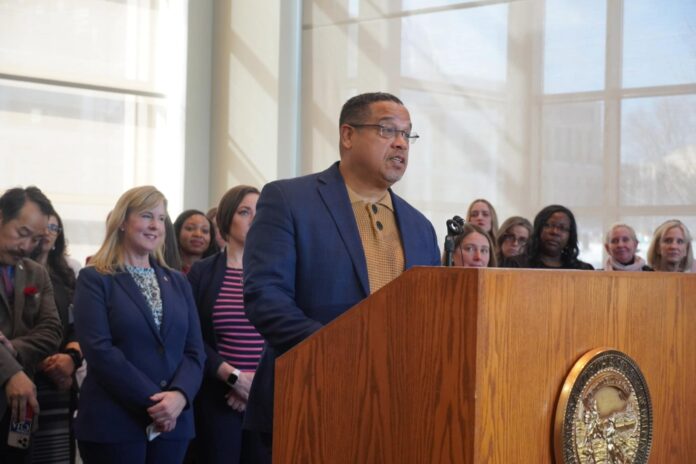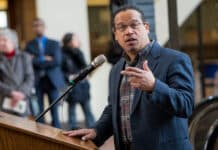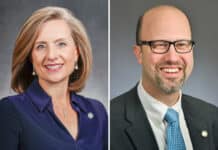
(Center of the American Experiment) — Keith Ellison, Minnesota’s attorney general, can clearly be heard pledging his support to individuals who would soon become his family’s campaign donors and later Feeding Our Future criminal defendants.
His recorded statements flatly contradict his contemporaneous public statements and raise uncomfortable questions about the intersection between political fundraising and constituent services.
American Experiment has exclusively obtained the complete 54-minute, 44-second audio file of a private December 2021 meeting between state Attorney General (AG) Keith Ellison and key figures in the Feeding Our Future scandal.
As I wrote last week, the audio file was named as Exhibit 710 on the evidence list presented to the court by Aimee Bock’s defense attorney, Kenneth Udoibok. The recording was not offered into evidence during the six-week trial that concluded last month, with Bock’s conviction on all seven counts she faced.
As a document, it exceeds expectations. Voices can be heard clearly and are clearly identifiable. The highlights, which are many, tend to be front-loaded. I’ve included below some clips from the meeting to highlight a few points.
The recording begins before the meeting starts. Attendees have assembled (apparently in Ellison’s official offices) and are already speaking, but formal introductions had not yet occurred.
The meeting proper begins at the 1:28 mark with introductions. The female voice heard beginning at 1:45 belongs to Ikram Mohamed. She is Feeding Our Future Defendant No. 63, overall, in the case and is expected to stand trial in December 2025.
Ikram worked as an employee/consultant for Feeding Our Future for a time and also participated in the free-food program independently. She has pled not guilty in the case.
Earlier in the recording you hear the voice of Salim Said, Defendant No. 3, co-owner of Safari Restaurant, and co-defendant with Bock in the recent trial. Said was convicted on all 21 counts he faced.
Ikram describes (1:08) Said as “a huge contributor to Mayor [Jacob] Frey” of Minneapolis. Ellison is heard (1:22) to respond, “I hope he [Frey] remembers.”
At the 2:45 mark, Abshir Omar is introduced. According to this October 2022 Minnesota Reformer profile, Omar formerly worked as a Bernie Sanders campaign manager in Iowa before joining Feeding Our Future as a consultant. Omar was also associated with the nonprofit Tasho, which operated six food distribution sites under Feeding. Omar has not been charged with any wrongdoing.
Other attendees are also introduced and have speaking parts, but they are less important to our story.
Omar kicks off the business portion of the meeting at 3:45, citing the litany of complaints against the state Departments of Education (MDE), Human Services (DHS), and Health (MDH).
The first, but hardly the last, accusation of racism is dropped at 4:20. Beginning at 6:00, Omar describes (offers) his organization‘s fundraising prowess (6:30) on behalf of “elected officials who are willing to protect communities of color.” To repeat, Omar has never been accused of any wrongdoing.
At 8:00, Ellison offers his initial thoughts on the meeting’s introductory remarks:
Ellison describes his interventions with then-DHS Commissioner Jodi Harpstead starting at 8:15. Harpstead left her post earlier this year. The Minnesota Star Tribune offered this headline in January 2025:
“Minnesota Department of Human Services Commissioner Jodi Harpstead leaving post:
Harpstead has led the department since 2019. She is departing as the agency faces renewed scrutiny over fraud in its programs.”
Ellison states on the recording that “we are in the middle of the battle with the agencies now” at 8:59. At 9:07, Ellison asserts that:
“Walz agrees with me that this piddly, stupid stuff running small people out of business is terrible.”
At 9:22, Ellison can be heard drawing a diagram on a whiteboard. At 9:50, Ellison agrees with the proposition that there is state agency discrimination against East African businesses.
At 11:30, Ellison brags that:
“Just being able to say, just getting the question, just getting the inquiry from the AG is sometimes enough to make people knock it off.”
We return to the tawdry subject of coin at the 13:00 mark, where Omar again offers his fundraising assistance to Ellison as a political candidate, apparently while sitting in Ellison’s official government office. Give it a listen:
Ellison can be heard (13:29) responding, “That’s right.”
Beginning at 14:30, Ellison’s visitors start getting into the details of their big beef with MDE. Ellison asks his guests basic questions about the food programs, how they operate and specific complaints about MDE.
Safari Restaurant is referenced by name for the first time at 17:33. At 18:36, Partners in Quality Care (Partners in Nutrition) and Feeding Our Future are first mentioned. Congresswoman Ilhan Omar’s connection to Safari Restaurant is mentioned at 21:10. At 25:30, Bloomington’s Dar Al-Farooq mosque is mentioned by name.
Much of their beef against MDE would be heard years later, repeated at the two courtroom trials held so far of Feeding Our Future defendants.
At 30:38, Ellison interrupts, saying, “This is the first I’m really hearing about it.” At 37:08, Ellison says, “This has not come to my attention until now.” These private statements in December 2021 completely contradict his September 2022 public statement:
“Minnesota Attorney General Keith Ellison and his office have been deeply involved for two years in holding Feeding Our Future accountable.”
Two years. Do the math.
At 35:40, Ellison mentions the name Mekfira Hussein, as he apparently reads this May 2021 Sahan Journal piece out loud from his office computer screen. Mekfira would later go on to become Defendant No. 48 and conviction No. 35, overall, in the case.
Turning their attention to other state agencies, at 37:30, the visitors begin name-checking several other frauds plaguing state government programs. We hear of medical transportation (37:38), childcare (CCAP, 40:18), and autism clinics (40:55).
The “ask” of Ellison begins around 43:30. Specifically, the request is for him, in the AG’s statutory role as attorney for state agencies, to intervene on behalf of these small businesses subject to racist government overregulation. At 44:26, Ellison assures his audience, “Of course, I’m here to help,” and at 45:00, “Let’s go fight these people.” Hear the Ellison battle plan:
Ellison continues with his strategy:
As the meeting is wrapping up, discussion turns to the date of the next get-together. At 54:37, Ellison can be heard mentioning the day’s date (Dec. 11) and an upcoming trip to Colombia. Then the recording abruptly ends.
On Dec. 20, Ellison accepted four campaign contributions totaling $10,000 (4X the max $2,500). Donor #1 was Gandi Mohamed, Defendant No. 69 and Ikram’s brother. Gandi has pled not guilty.
Donor #2 was a man (not mentioned above) whose voice can be heard on the Dec. 11 recording, but who has not been charged with any wrongdoing. A third donation was given by a man, also not charged in the case, whose name was mentioned in open court during the most recent Feeding Our Future trial.
That same day (Dec. 20), Ellison’s son, Minneapolis City Council member Jeremiah Ellison, accepted campaign contributions from Gandi and K. Ellison’s Donor #2.
In addition, Jeremiah Ellison accepted donations from Salid Said, Ikram, Ikram’s husband, and Gandi’s wife. Also giving were four others later indicted in the case.
Exactly one month after that, on Jan. 20, 2022, the now-famous FBI raids were conducted, shutting down the operations of both Feeding Our Future and Partners in Nutrition.
For those gluttons in the audience, the entire recording can be heard here.
This article was originally published by Center of the American Experiment.















